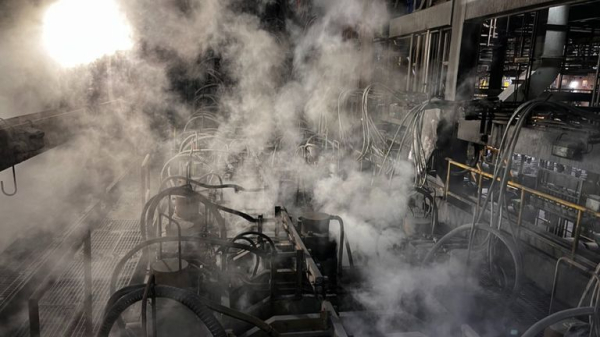Government closes in on £500m deal with Tata Steel to secure Port Talbot future

The government and Tata Steel are on the brink of an agreement that will secure the future of the country’s biggest steelworks but pave the way for thousands of long-term job losses.
Sky News has learnt that Whitehall officials are in preliminary talks about a financial support package to assist Tata Steel employees who may face redundancy as the Port Talbot plant transitions from blast furnaces to greener steel production.
Sources said on Wednesday that the government and the Indian-owned company were hopeful of finalising a deal as soon as the end of this week, although they acknowledged that the timetable could still slip.
Under the agreement, an aid package worth in the region of £500m will be handed to Tata Steel, while the company itself is expected to commit approximately £700m to modernising the Port Talbot plant.
Sky News revealed details of the talks earlier this month.
Government insiders said they had agreed to the funding package because without it, 8,000 manufacturing jobs were likely to be lost.
Tata Steel is understood to have sought a much larger sum of British taxpayers’ money earlier in the negotiations.
Port Talbot employs about 4,000 people – roughly half of Tata Steel’s overall UK workforce.

The company is said to have indicated that as many as 3,000 of its British-based staff were likely to lose their jobs, even with the government’s financial support.
Electric arc furnaces, which Tata Steel would commit to building as part of the agreement with government, utilise different, less labour-intensive, processes to produce steel than traditional blast furnaces.
The government has accepted that some job losses would be inevitable as part of the transition to reducing carbon emissions, although an insider said on Saturday that a number of those could be through workers taking early retirement.
The final scope and timing of any redundancies would be negotiated between the company and trade union officials.
A formal agreement will mark the second time this year that the government has bankrolled investment in a manufacturing business owned by Tata Group.
In July, it agreed to commit several hundred million pounds to the company to construct a £4bn battery factory in the UK for its Jaguar Land Rover subsidiary.
Rishi Sunak, the prime minister, described the investment as “a massive vote of confidence” in British industry.
Ministers and Britain’s two biggest steelmakers have been in talks for months about handing over hundreds of millions of pounds of taxpayers’ money to fund the companies’ transition to greener production.

Initially, both Tata Steel and British Steel, its smaller rival, were offered £300m each in government support, but formal agreements have remained elusive.
A deal with the government will draw a line under years of uncertainty about the medium-term future of Port Talbot, although it was unclear whether the company would make specific commitments about the long-term as part of a deal.
As recently as May this year, Tata Steel warned of a “material uncertainty” over the future of its British business, citing a lack of clarity about potential government support among the factors raising doubts over its prospects.
The Department for Business and Trade said it would not comment on ongoing talks, while Tata Steel repeated a statement from earlier this month that it was “continuing to discuss with the UK government a framework for continuity and decarbonisation of steel making in the UK amidst very challenging underlying business conditions given that several of its heavy end assets are approaching end of life.”
“Given the financially constrained position of our UK business, any significant change is only possible with government investment and support, as also seen in other steel making countries in Europe where governments are actively supporting companies in decarbonising initiatives.”
